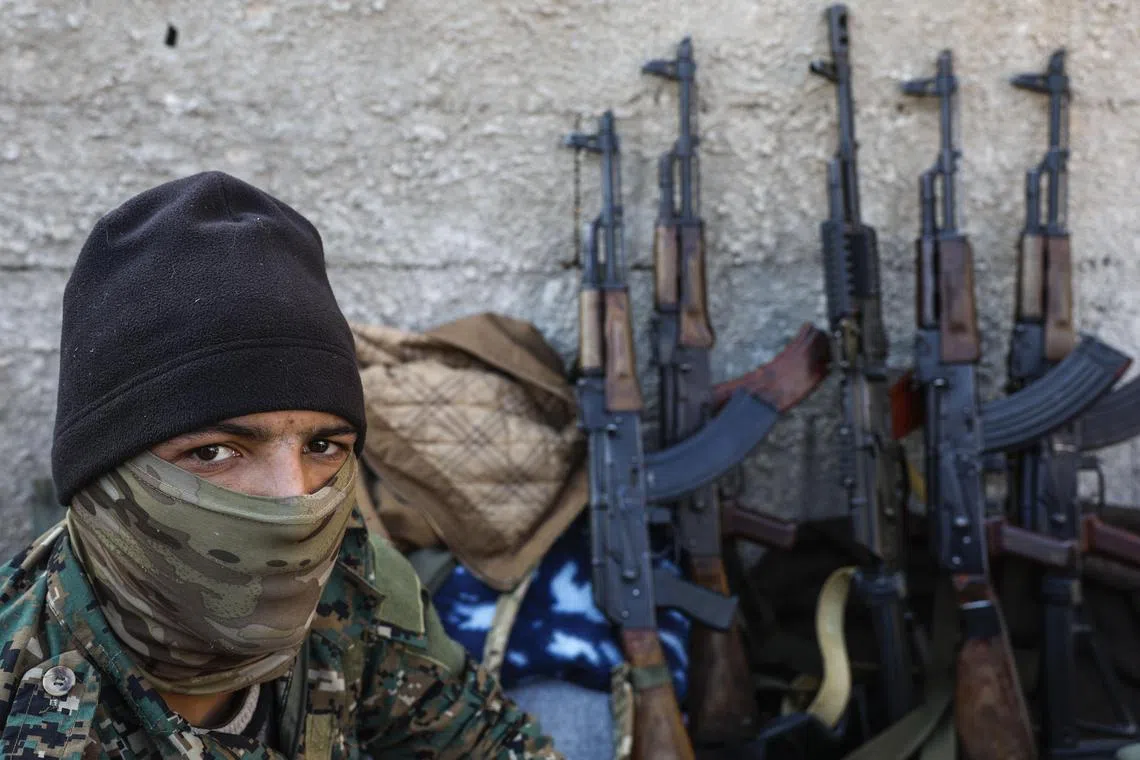Syria’s rebel leader vows to disband, integrate armed factions
Sign up now: Get ST's newsletters delivered to your inbox

Rebel fighters would be brought under the authority of the Defence Ministry.
PHOTO: EPA-EFE
Follow topic:
BEIRUT – The leader of the rebel coalition that took power in Syria in December said all armed opposition groups in the country would be dissolved, Syrian state media reported on Dec 17, as the new government worked to build a functioning state.
Mr Ahmed al-Sharaa, head of the coalition, said the rebel fighters would be brought under the authority of the Defence Ministry.
It was not clear how or when this would be achieved, or whether the competing armed factions would agree.
But Mr Sharaa, formerly known as Abu Mohammad al-Jolani, said “everyone will be subject to the law”, according to Syria’s state news agency Sana.
His comments came more than a week after the fall of ousted president Bashar al-Assad’s regime
As regional powers continued to jockey for control and influence in Syria, Israeli Prime Minister Benjamin Netanyahu made a trip on Dec 17 to territory in south-western Syria that his country’s military had seized after rebels toppled the Assad regime.
Israeli forces have pushed beyond Israeli-controlled areas in the Golan Heights and a buffer zone along the border for the first time in decades, capturing an area that includes the summit of Mount Hermon
Mr Netanyahu said Israeli forces would remain on the mountain “until another arrangement is found that guarantees Israel’s security”.
He was accompanied by Defence Minister Israel Katz and other officials.
A statement issued later by Mr Katz’s spokesman Adir Dahan said they visited outposts on the peak of Mount Hermon, about 9.6km from the border of the Golan Heights.
The statement offered an expanded rationale for an ongoing Israeli presence there, saying that holding the mountain summit would enable the military to better observe Hezbollah militants in the Bekaa Valley of neighbouring Lebanon.
The Israeli military must complete the construction of fortifications and arrangements for soldiers “to fully prepare for the possibility of an extended presence at the site”, Mr Katz said in the statement.
Syria’s new leadership is likely to view the Israeli move into Syrian territory and the officials’ unannounced trip as provocative.
The visit and the military manoeuvres showcase some of the challenges facing the former rebels now holding Damascus as they struggle to consolidate territorial control in the face of outside interests.
In an interview with The New York Times and other news outlets on Dec 16, Mr Sharaa criticised the Israeli military’s advance into and beyond the buffer zone, and said Syria would continue to abide by the 1974 agreement that followed the end of the 1973 war.
He called on the international community to make sure that Israel followed it, too.
Domestically, Mr Sharaa’s attempts to consolidate power are accelerating with the announcement that rebel groups would be disbanded.
The US, other countries and the UN still consider the rebel group led by Mr Sharaa, Hayat Tahrir al-Sham, to be a terrorist organisation.
That label severely limits the aid that countries and organisations can provide to the new government. Mr Sharaa has called on nations to remove the designation.
US Secretary of State Antony Blinken said at the weekend that the US had been in direct contact with the rebels and that the US was prepared to help them “succeed”.
While pushing to maintain law and order, Mr Sharaa also appears to be trying to get public institutions back up and running, and to restore vital infrastructure in the country.
“Syria is tired of wars, and we want to build a state and institutions away from conflicts,” he said in the interview on Dec 16.
Those state-building efforts are beginning to take shape.
Preparations are under way to reopen Syria’s two main airports in Damascus and Aleppo. Syria’s state news agency has also been broadcasting administrative bulletins about central bank exchange rates and recruitment calls for the police, once a feared tentacle of the Assad regime’s security apparatus.
The new Interior Ministry announced that applicants could enrol in police academies in Damascus and other major cities, and directed them to a registration link to begin the process.
State-run news agency Sana, once an arm of the Assad government, has been posting daily updates, in an apparent attempt to allay concerns over potential instability.
On Dec 16, it posted pictures of clean floors and welcome signs at the Aleppo airport, a sharp contrast with the images of armed fighters roaming the terminal just days earlier, after they captured it in a lightning-fast advance across the country.
The news agency also reported a meeting between top British diplomats and Mr Sharaa, who urged Britain to lift sanctions imposed on Syria under the Assad regime and to restore relations between the two countries.
More widely across Europe, European Commission president Ursula von der Leyen said on Dec 17 that the European Union would have to continue its engagement with Hayat Tahrir al-Sham and other factions in Syria to help the country rebuild.
“We would need to start a discussion on sanctions reliefs,” she said, speaking alongside Turkey’s President Recep Tayyip Erdogan
Dr von der Leyen also said Europe was committed to supporting Syria’s reconstruction and that the first delivery of supplies donated from Europe would arrive in the coming days.
The European Commission said last week that it would give more than 100 tonnes of food, medicine and health supplies to Syria. NYTIMES

